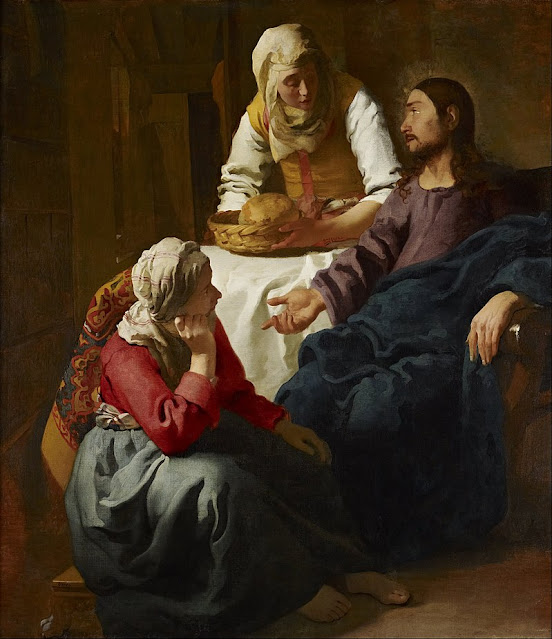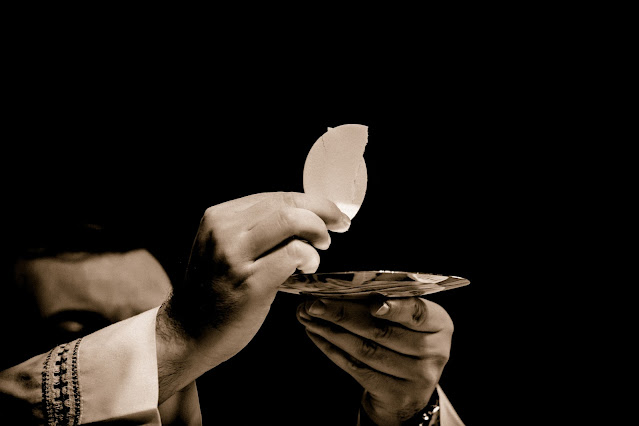Showing posts with the label Sacred Music
Jesus at the home of Martha and Mary | Johannes Vermeer Much digital ink has been spilled about the notion of active participation in the Liturgy. That same notion should read actual participation , but due to a misleading translation of the Latin participatio actuosa , Latin Rite Catholics have been subjected to an incessant barrage of activities at Mass that constitute an unfortunate layering of events that practically force people to embrace a misstated concept in an attempt to engage us in worship. More than acting out, Christ calls us to be present to him in the Liturgy. Holy receptivity is being open-minded and willing to receive divine direction and grace. It entails fostering an open heart and mind to God's presence and teachings, which allows for spiritual growth and transformation. Core Elements of Holy Receptivity Openness and Humility. Holy receptivity involves a posture of humility, acknowledging one's dependence on God and a willingness to be taught and led. Act...

The period of Ordinary Time from Pentecost until Advent in the calendar that is followed by the majority of Latin Rite Catholics, i.e., those who follow the calendar for the Novus Ordo Mass of Pope Saint Paul VI, is referred to as Trinitytide in the Personal Ordinariates . It is the longest season of the Church year. Anglo-Saxon churches and parts of northern Europe celebrated a feast of the Trinity as early as the 9th century. Saint Thomas Becket (1119 or 1120–1170), who was made bishop on the Sunday following Pentecost, is known to have celebrated the feast of the Holy Trinity at Canterbury. In 1334, Pope John XXII instituted the Feast of the Holy Trinity for the entire Church on the first Sunday after Pentecost. Trinitytide begins on the Sunday following Whitsuntide (the Octave of Pentecost). Trinitytide is a time of hope-filled Christian discipleship that arises from living in communion with the Holy Trinity. The Holy Trinity is central to authentic Christian mission. When Jesus se...
DURANDUS | NLM Evensong is a liturgy of the Daily Office where psalms and other biblical passages are sung or said, usually close to sunset. The Latin word vesperas was rendered as aefensang by Old English speakers, and this became "evensong" in modern English. https://singtheoffice.com/ | Music companion for chanting the Office. Variable audio support available. A very useful site! Structure The office of Vespers normally includes psalms, the Magnificat , a hymn, and other prayers. By the Early Middle Ages, it became common for secular clergy to combine Vespers and Compline . By the sixteenth century, worshippers in western Europe conceived 'evensong' as Vespers and Compline performed without break. Modern Byzantine services advertised as 'vespers' often similarly conclude with Compline . Background The Anglican archbishop Thomas Cranmer created choral evensong as a component of the Book of Common Prayer (1549) during the Edwardian Reformation, drawing on t...
[ 7 minute read ] What's on the menu? Decades of impromptu and unsanctioned changes to form and content by clergy and laity have frequently rendered celebrations of the Novus Ordo liturgy a mess, even a disaster. Those who have participated in liturgical abuses of one kind or another may have their ideas and actions judged as those of: the rebel Catholic: a willfully disobedient individual who imagines there are no absolutes except those he or she demands the right to impose. His or her disdain for liturgical law, rubrics, norms and principles that preserve the ars celebrandi and the integrity of the Mass , reveals a latent hostility toward the authority of Jesus Christ and His Church. the woefully ignorant child of a rebel whose comfortable religion (of compromise) is the predictable outcome of a well entrenched generational bias. the enthusiastic but woefully ignorant proponent of popularism (liturgical democracy?) emanating in various forms that pretend at authentic engagement....
Canons Regular of Saint John Cantius The word Alleluia holds deep significance in the Catholic Church. Origins and Meaning The word Alleluia originates from the Hebrew phrase " Hallelu Yah ", meaning "Praise the Lord". It was used in the Jewish liturgy and passed into the early Christian Church, where it took on a deeper spiritual meaning. The word is a "kind of acclamation and a form of ovation" expressing joy, thanksgiving, and triumph in the Lord. Liturgical Use The Alleluia has a prominent place in Catholic liturgy, particularly during the Easter season and in hymns of praise. It is a exclamation of joy and a climactic moment in the liturgy, such as before the Gospel reading. The repetition of "Alleluia" is seen as a continuous "breath of the soul" in praise of God. Spiritual Significance For Catholics, the Alleluia represents a profound expression of devotion and spiritual exaltation. St. Augustine described it as a "consolati...
In the Ordinariate Mass, after The Peace , a beautiful exchange takes place that adds to the distinct flavour of Divine Worship among Catholic liturgies. That exchange, our anthem to Christ crucified, is commonly referred to as the Pascha Nostrum . Rubrics from Divine Worship: the Missal The People kneel. As the Priest takes the Host and breaks it, he sings or says: ( Alleluia . ) Christ our Passover is sacrificed for us ; People: Therefore let us keep the feast . ( Alleluia . ) The Fraction (Fractio Panis and Comingling). The Priest places a particle of the Host in the Chalice, making the Sign of the Cross with it, saying quietly: May this mingling and consecration of the Body and Blood of our Lord Jesus Christ bring eternal life to us who receive it. The Priest genuflects, and then the Agnus Dei is sung or said. The Biblical Text 1 Corinthians 5:7–8 Biblia Sacra Vulgata Expurgate vetus fermentum, ut sitis nova conspersio, sicut estis azymi. ...

Tra le Sollecitudini Instruction on Sacred Music Pope Pius X Motu Proprio promulgated on November 22, 1903 5. The Church has always recognized and favoured the progress of the arts, admitting to the service of religion everything good and beautiful discovered by genius in the course of ages always, however, with due regard to the liturgical laws . Consequently modern music is also admitted to the Church, since it, too, furnishes compositions of such excellence, sobriety and gravity, that they are in no way unworthy of the liturgical functions. Still, since modern music has risen mainly to serve profane uses, greater care must be taken with regard to it, in order that the musical compositions of modern style which are admitted in the Church may contain nothing profane, be free from reminiscences of motifs adopted in the theatres, and be not fashioned even in their external forms after the manner of profane pieces . Among the different kinds of modern music, that which appears less suita...
Motet (Just for fun, choose a part and sing along!) Emendemus in melius (Let us amend for the better) Matins response for the first Sunday in Lent by William Byrd for SATTB voices Cantiones sacrae, quae ab argumento sacrae vocantur (1575) Emendemus in melius quae ignoranter peccavimus; ne subito praeoccupati die mortis, quaeramus spatium poenitentiae, et invenire non possimus. Attende, Domine, et miserere; quia peccavimus tibi. Adjuva nos, Deus salutaris noster, et propter honorem nominis tui libera nos. Let us amend for the better in those things in which we have sinned through ignorance; lest suddenly overtaken by the day of death, we seek space for repentance, and be not able to find it. Hearken, O Lord, and have mercy: for we have sinned against thee. Help us, O God of our salvation, and for the honour of thy name deliver us. (English translation by William Mahrt ) List of melodies: https://cantus.uwaterloo.ca/chant/516275 Score: ...
Detail from The Garden of Earthly Delights by Heironymous Bosch We in the Ordinariate are blessed with a wealth of great music - hymns, polyphony, chant - from both the pre-Reformation Catholic patrimony and the sacred music that continued to be developed and celebrated in the venerable Anglican patrimony. The wealth of the Anglican patrimony, its awe inspiring treasure trove of sacred music, is a treasure ready to be shared throughout the entire Catholic Church. One wonders why, when so many glorious compositions are available, people retain an almost addictive attachment to compositions that are to great works of art as junk food is to cuisine? A diet of spiritual junk food has a serious effect on the well being of a person. A diet of spiritual junk food robs the soul of "nutrients", the art through which God - the True, the Good and the Beautiful - offers the worshipper who reaches out to God for life, love, hope, mercy and forgiveness. Sure, God can and does reach peop...
TRUE PARTICIPATION IN THE MASS
"I was gathered into the offering of the Son to the Father. I participated in the self-offering of God today."
FEATURED SCRIPTURE | Revelation 7:9-12
AFTER this I looked, and behold, a great multitude which no man could number, from every nation, from all tribes and peoples and tongues, standing before the throne and before the Lamb, clothed in white robes, with palm branches in their hands, and crying out with a loud voice, “Salvation belongs to our God who sits upon the throne, and to the Lamb!” And all the angels stood round the throne and round the elders and the four living creatures, and they fell on their faces before the throne and worshiped God, saying, “Amen! Blessing and glory and wisdom and thanksgiving and honor and power and might be to our God for ever and ever! Amen.”
THE GOLDEN ARROW
May the most holy, most sacred, most adorable, most incomprehensible and unutterable Name of God be always praised, blessed, loved, adored and glorified in Heaven, on earth, and under the earth, by all the creatures of God, and by the Sacred Heart of Our Lord Jesus Christ, in the Most Holy Sacrament of the Altar. Amen.
FEATURED QUOTE
When you want to help people, you tell them the truth. When you want to help yourself, you tell them what they want to hear. ― Thomas Sowell







